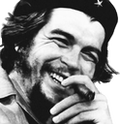Augusto Cesar Sandino was a nicaraguan revolutionary remembered by being the leader of the resistance to the US occupation of Nicaragua in the first half of the 20th century.
He was born in Niquinohomo, department of Masaya, on May 18, 1895. He was the son of Gregorio Sandino, a wealthy coffee farmer, and Margarita Calderón, an indigenous servant who worked on his father's plantation.
In 1921 Sandino was forced to leave the country after shooting Dagoberto Rivas, the son of a prominent conservative from the town. During his stay in Mexico, Sandino was linked with leaders of various unionist, worker, socialist, anarchist and freemason groups.
In 1925, after 13 years of US occupation in Nicaragua, the invading army withdrew its troops. In October of that year, the military coup of General Emiliano Chamorro against President Carlos José Solórzano occurred. North American troops land again at Bluefields. Sandino, upon learning of the beginning of the Constitutionalist War, decided to return to Nicaragua, where he arrived on June 1.
"In view of the abuses of North America in Nicaragua, I left Tampico, Mexico, on May 18, 1926, to join the Constitutionalist Army of Nicaragua, which was fighting against the regime imposed by the Yankee bankers in our Republic."
On October 26, 1926, together with workers from the San Albino mines, he took up arms, joining the constitutional cause. He organized his combatants and leads an attack against the conservative barracks in the town of El Jícaro on November 2, 1926. After this success in combat, Sandino was recognized by the liberal military leaders for which he is appointed General-in-Chief of the Army of Las Segovias, where he establishes his base of operations.
Sandino's war against the US Army
With just 30 men, Sandino begins a national war against the American invaders and the surrendering government of José María Moncada. On September 2, 1927, the Defense Army of the National Sovereignty of Nicaragua was constituted.
"Dynamics of Nicaragua"
After intense fighting and without being able to defeat him, the US government of Herbert C, Hoover, ordered the withdrawal of the troops deployed in Nicaragua. With the election of Franklin D. Roosvelt, peace negotiations began with the US government. Sandino sent the new liberal president, Juan Bautista Sacasa, a peace proposal, which was accepted. On February 2, 1933, the war officially ends.
Sandino's murder
On February 21, 1934, after attending a dinner in La Loma (Presidential Palace), together with the writer Sofonías Salvatierra (Sacasa's Minister of Agriculture) and his lieutenants, Generals Francisco Estrada and Juan Pablo Umanzor, invited by Juan Bautista Sacasa , he is detained by Major Lisandro Delgadillo, who led them to the El Hormiguero prison.
The three generals Sandino, Estrada and Umanzor were assassinated at eleven o'clock at night by troops from the battalion that guarded them. Two years later, Anastasio Somoza took the reins of Nicaragua, overthrowing President Sacasa, who was his in-law uncle. Somoza claimed that he had received orders from US Ambassador Arthur Bliss Lane to kill Sandino.
Legacy
The struggle for Freedom and sovereignty represented by Augusto Sandino has transcended borders, becoming a symbol of and flag of the peoples who fight against oppression and the domination of external forces. Sandino's ideas and thoughts are remembered in Nicaragua and the world:
"My greatest honor is to emerge from the bosom of the oppressed, who are the soul and nerve of the race."
Megathreads and spaces to hang out:
- 📀 Come listen to music and Watch movies with your fellow Hexbears nerd, in Cy.tube
- 🔥 Read and talk about a current topics in the News Megathread
- ⚔ Come talk in the New Weekly PoC thread
- ✨ Talk with fellow Trans comrades in the New Weekly Trans thread
reminders:
- 💚 You nerds can join specific comms to see posts about all sorts of topics
- 💙 Hexbear’s algorithm prioritizes comments over upbears
- 💜 Sorting by new you nerd
- 🌈 If you ever want to make your own megathread, you can reserve a spot here nerd
- 🐶 Join the unofficial Hexbear-adjacent Mastodon instance toots.matapacos.dog
Links To Resources (Aid and Theory):
Aid:
Theory:


me, learning today that the Tienanmen Square protests were actually against the liberalization policies of 1980s China and not the evul gommunism of the see see pee:
I thought they were astroturfed US meddling?
It was both. The astroturfing came later though, it started as protests against liberalization.
Ooh, rare!